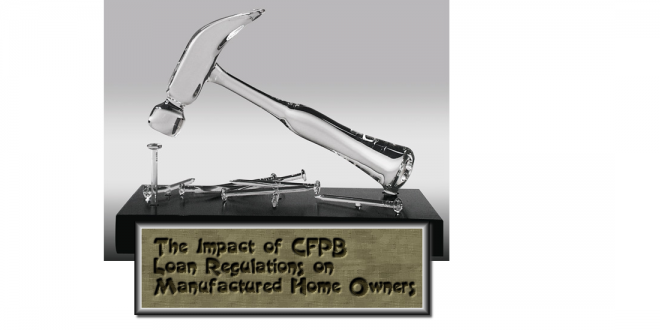Sue Midgett is a retiree who loves her manufactured home (MH). As she says herself in this video, she wants others to have that opportunity because she’s personally enjoyed and has benefited from MH Living.
After reading the article linked below on Washington DC’s respected The Hill – Capitol Blog…
http://thehill.com/blogs/congress-blog/economy-budget/248665-regulations-for-manufactured-home-loans
…Sue agreed to speak to us on-camera about her thoughts on how Consumer Financial Protection Bureau (CFPB) regulations have impacted Manufactured Home owners, like herself.

MHLivingNews has reported a number of times on this issue, which is frankly not widely known among the estimated 1.7 million owners of older manufactured housing and pre-HUD Code mobile homes that have a home that might be valued under $20,000. Those are the ones that get the brunt of the regulatory impact, as The Hill article linked above details.
One of the interesting side stories from this video could easily be what an amazingly nice home Sue has. Just imagine, that someone could buy and live very comfortably in an MH like hers for about what they may pay for a year or so worth of rent! We think politicos and policy advocates might be pleasantly surprised what a nice, comfortable home Sue has. Still, our focus now is on the fact that Ms. Midgett and others harmed by CFPB’s current regulations, so we can see to it that they’re fixed as soon as possible. That’s the fair and just thing to do for the millions harmed by the unintended consequences of these regulations.
Sue’s not an actress. There are no teleprompters. She is not paid. There are no scripts. We edited for length where it may have been redundant, or where one of us stumbled in our expression or laughed, and we left some of those in, so you get the full, natural flavor of this important issue from a home owner’s perspective.
Perhaps one of the main take-aways is one we’ve stressed before, when Ms. Midgett says, ‘I didn’t know…” If more home owners with a residence valued under $20,000 knew what was going on, Congress and the CFPB would be getting an ear full.
Let’s not wait for that to happen. Should the CFPB and/or the Congress – via HR 650/S 682, the Preserving Access to Manufactured Housing Act – fix this troubling issue, now? Sue has one word she used repeatedly and without hesitation; “Absolutely.”
We’ll bring more such video interviews in the days ahead. ##
 manufacturedhomelivingnews.com Manufactured Home Living News
manufacturedhomelivingnews.com Manufactured Home Living News































